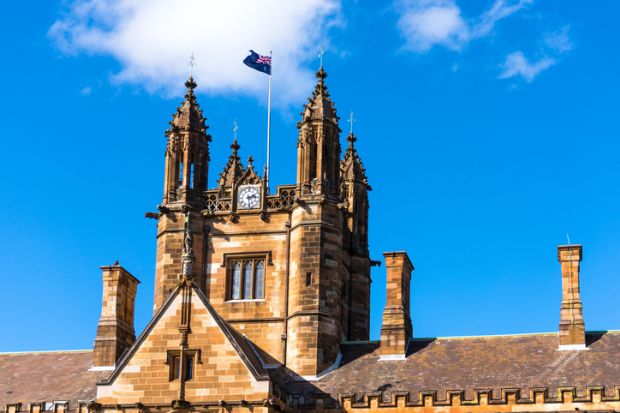Australia’s oldest university has announced austerity measures to address an estimated shortfall of at least A$200 million (£102 million) from the coronavirus epidemic.
Effective immediately, the University of Sydney will limit spending on building, travel and recruitment as part of “temporary savings measures” to protect its A$2.8 billion budget.
The university will also defer all “non-essential” projects and review existing and proposed arrangements with external contractors and consultants. Recruitment will only proceed for roles funded by external research grants or where written offers have already been lodged.
International travel will be limited to trips considered “essential” or those funded externally. Most capital expenditure, other than building projects fully funded by external grants or philanthropy, will be “paused”.
Vice-chancellor Michael Spence said the measures were articulated in the university’s “longstanding” financial risk mitigation plan and came “on top of our already prudent budgeting means”.
“We know these measures will create some challenges, but they are aimed at ensuring we can continue to contain the financial impact of this ongoing global health crisis,” he said.
“We’ve always made responsible financial planning a priority and have a range of strategies in place to allow us to respond to a number of different financial scenarios, including this current one.”
The University of Wollongong is among the other universities that have tightened their belts in response to the coronavirus crisis. In mid-February, vice-chancellor Paul Wellings announced an “expenditure control process” across all university activities.
In New Zealand, Victoria University of Wellington has reportedly imposed a hiring freeze and is considering staff lay-offs amid an estimated NZ$12 million (£5.9 million) hit from the loss of Chinese students’ tuition fees.
The government had considered exempting students from the ban on non-nationals entering directly from China, but decided not to after New Zealand’s first coronavirus infection was reported late last month.
Dr Spence said modelling commissioned by Sydney showed that the coronavirus impact would be felt far beyond the higher education sector and could cause a “significant shock” to the New South Wales economy.
The university said two scenarios had been modelled. The first, in which 8,700 students deferred for a semester, would reduce the gross state product by about A$1.4 billion and affect 10,700 full-time jobs. A more extreme scenario, where 15,000 international students put off their degrees for an entire year, would cost A$2.2 billion and affect 15,000 jobs.
Dr Spence said the modelling showed that the benefits delivered by international students went well beyond the university gate. “For retailers, hospitality workers and tradespeople, international students are helping to keep the NSW economy turning,” he said.
“That’s why it’s so important that we have a whole of government approach to ensure Sydney continues to remain a destination of choice for those seeking a world-leading international education, especially once this crisis is over.”
On 27 February, Australian prime minister Scott Morrison flagged assistance packages for the education and tourism sectors, both of which have been hit hard by the coronavirus, but stressed that any government aid would be “targeted, modest and scalable”.
In a separate development, The Australian newspaper has reported that a Chinese national enrolled at the University of Queensland was diagnosed with the coronavirus after entering Australia via a two-week layover in Dubai. Thousands of students are believed to have harnessed the “third country” option to beat the ban on direct arrivals from China.
Register to continue
Why register?
- Registration is free and only takes a moment
- Once registered, you can read 3 articles a month
- Sign up for our newsletter
Subscribe
Or subscribe for unlimited access to:
- Unlimited access to news, views, insights & reviews
- Digital editions
- Digital access to THE’s university and college rankings analysis
Already registered or a current subscriber? Login










